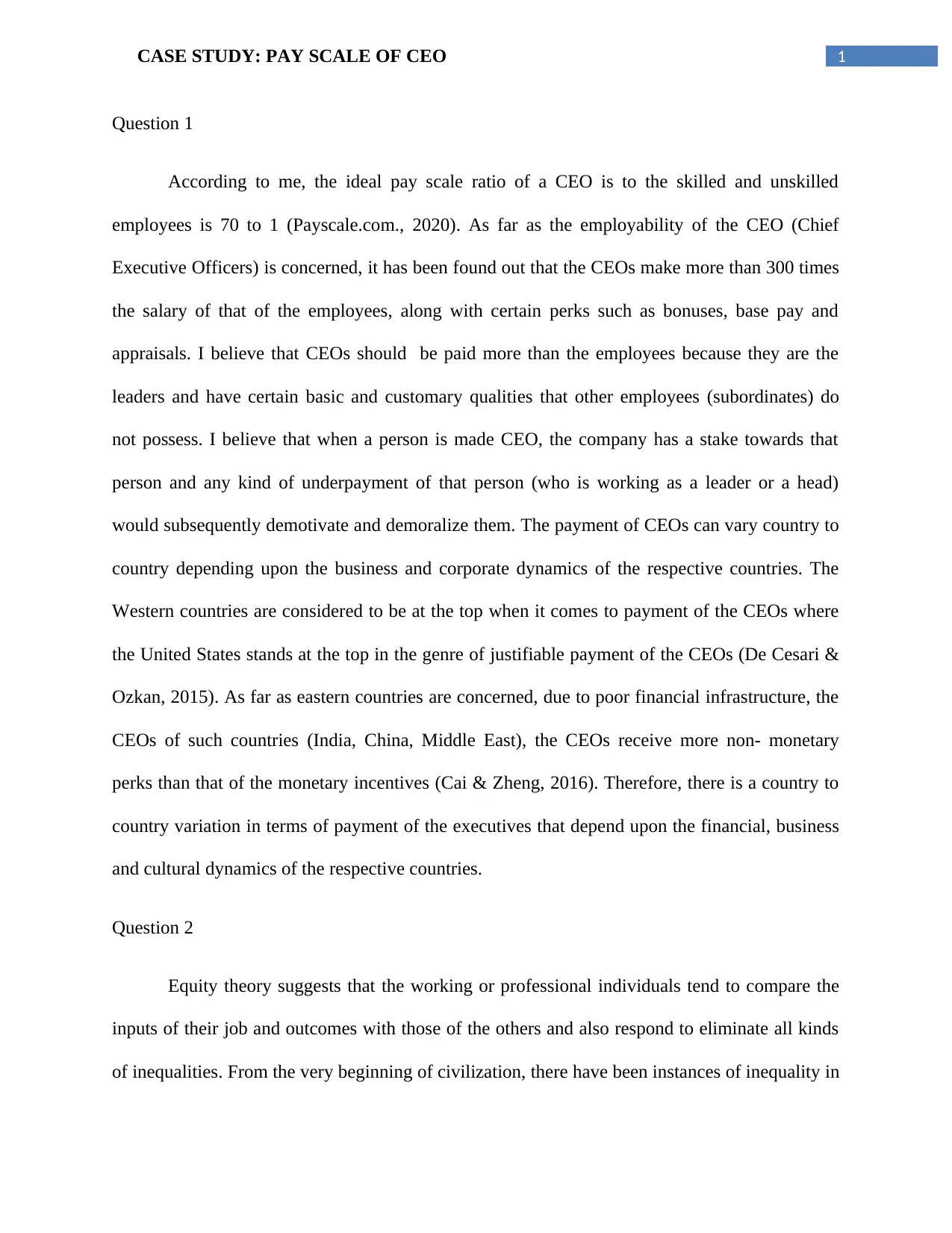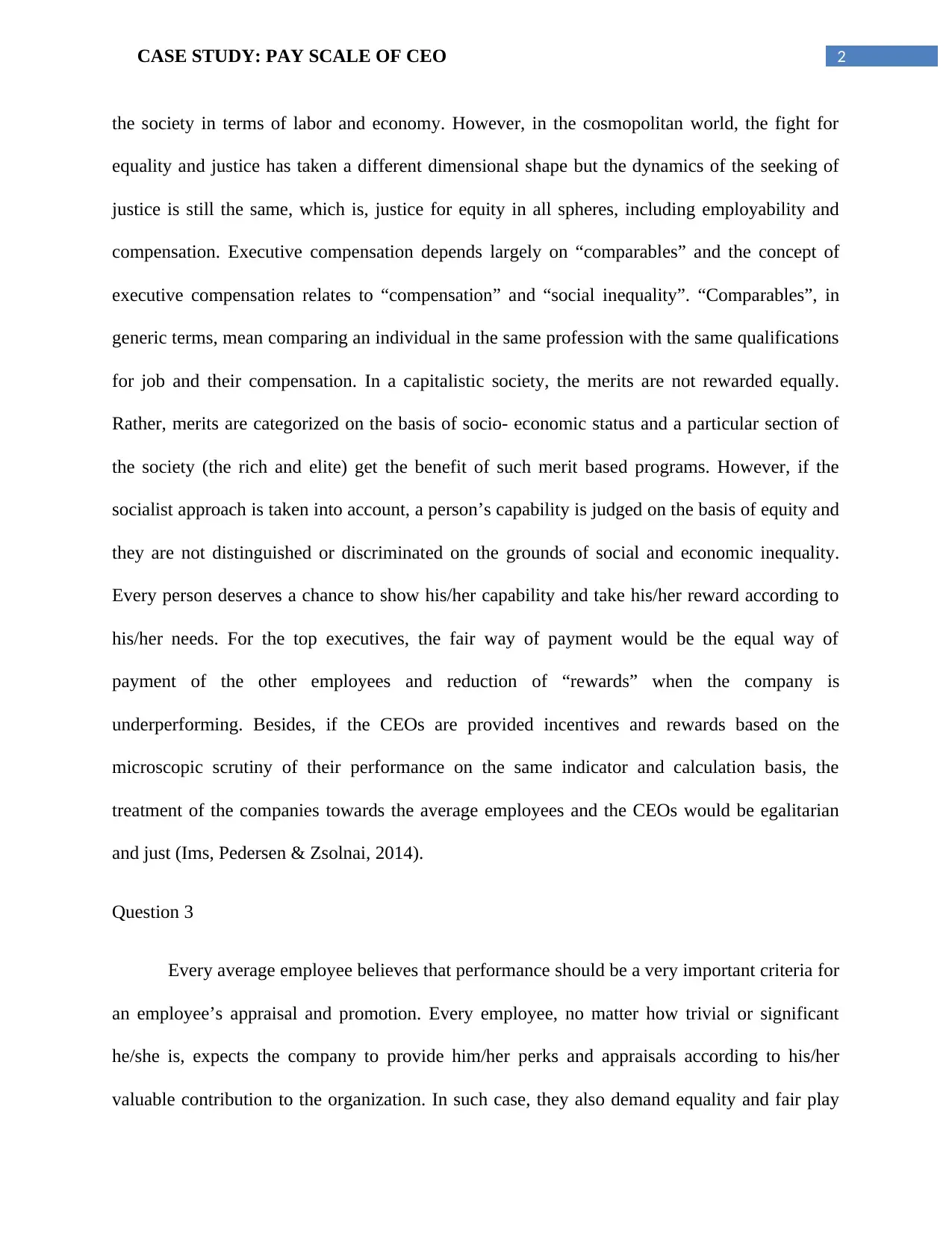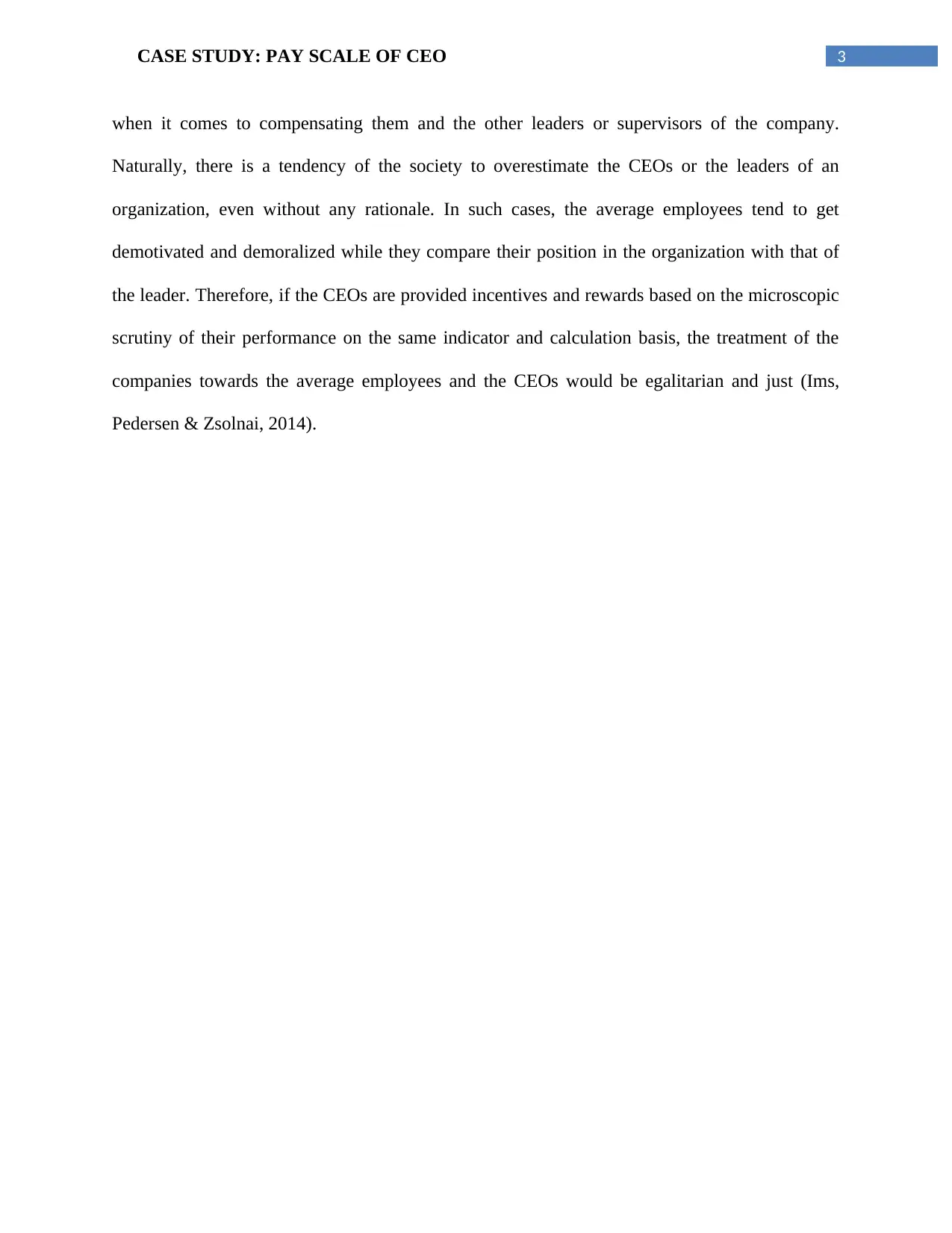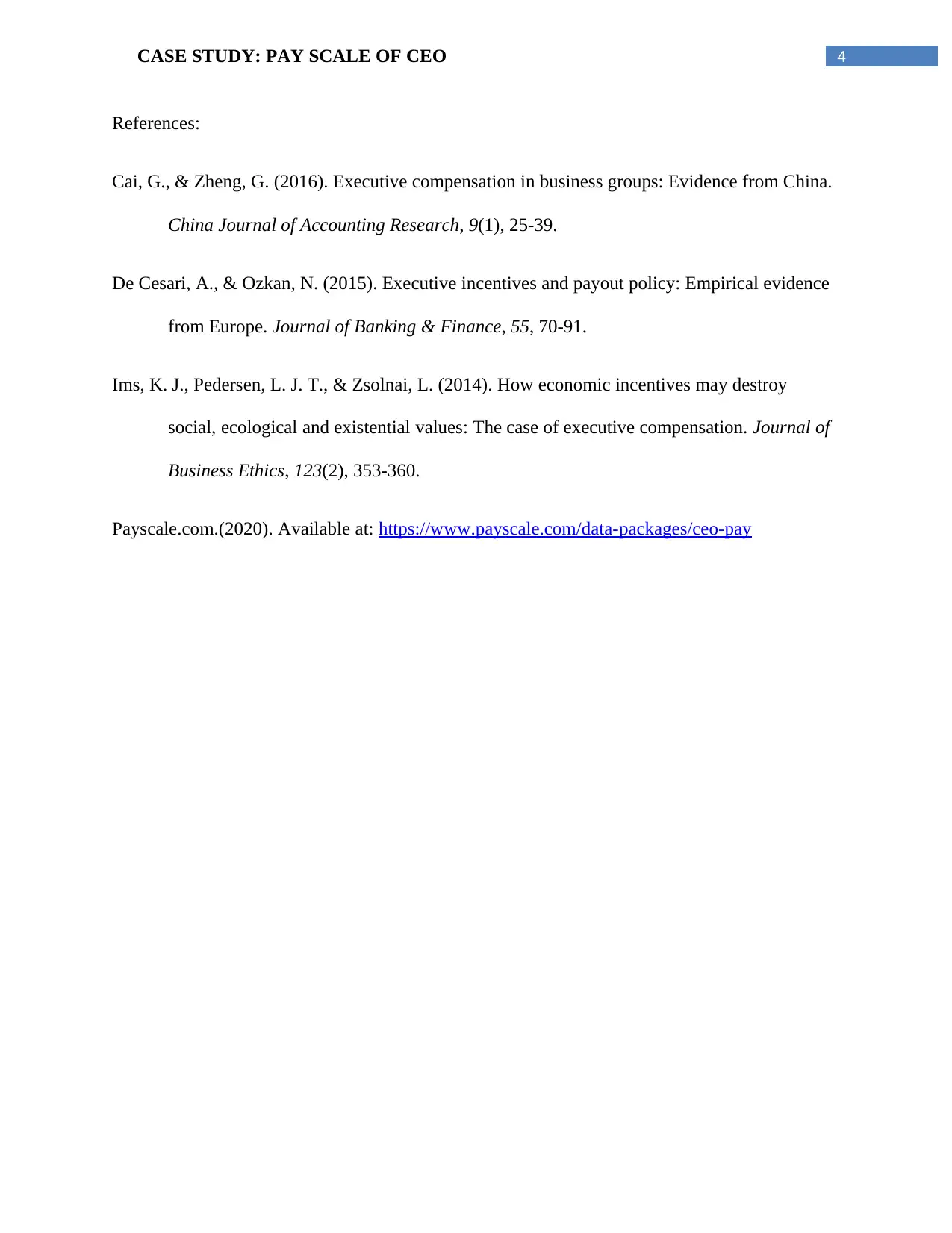University Case Study: CEO Pay Scale, Equity, and Performance
VerifiedAdded on 2022/08/15
|5
|1000
|15
Case Study
AI Summary
This case study examines the ideal CEO pay scale ratio, equity theory, and the impact of executive compensation on employee motivation and organizational justice. The student argues for a 70:1 pay ratio between CEOs and skilled/unskilled employees, emphasizing the importance of fair compensation and performance-based rewards. The analysis explores how equity theory influences employee perceptions of fairness and the need for equitable treatment in compensation. The study also highlights the role of performance evaluation in determining incentives and rewards, advocating for a consistent approach to compensate both CEOs and average employees. It references relevant literature to support arguments on executive compensation, organizational behavior, and motivation, including the impact of pay structures on employee morale and productivity.

Running head: CASE STUDY: PAY SCALE OF CEO
CASE STUDY: PAY SCALE OF CEO
Name of the student
Name of the university
Author Note
CASE STUDY: PAY SCALE OF CEO
Name of the student
Name of the university
Author Note
Paraphrase This Document
Need a fresh take? Get an instant paraphrase of this document with our AI Paraphraser

1CASE STUDY: PAY SCALE OF CEO
Question 1
According to me, the ideal pay scale ratio of a CEO is to the skilled and unskilled
employees is 70 to 1 (Payscale.com., 2020). As far as the employability of the CEO (Chief
Executive Officers) is concerned, it has been found out that the CEOs make more than 300 times
the salary of that of the employees, along with certain perks such as bonuses, base pay and
appraisals. I believe that CEOs should be paid more than the employees because they are the
leaders and have certain basic and customary qualities that other employees (subordinates) do
not possess. I believe that when a person is made CEO, the company has a stake towards that
person and any kind of underpayment of that person (who is working as a leader or a head)
would subsequently demotivate and demoralize them. The payment of CEOs can vary country to
country depending upon the business and corporate dynamics of the respective countries. The
Western countries are considered to be at the top when it comes to payment of the CEOs where
the United States stands at the top in the genre of justifiable payment of the CEOs (De Cesari &
Ozkan, 2015). As far as eastern countries are concerned, due to poor financial infrastructure, the
CEOs of such countries (India, China, Middle East), the CEOs receive more non- monetary
perks than that of the monetary incentives (Cai & Zheng, 2016). Therefore, there is a country to
country variation in terms of payment of the executives that depend upon the financial, business
and cultural dynamics of the respective countries.
Question 2
Equity theory suggests that the working or professional individuals tend to compare the
inputs of their job and outcomes with those of the others and also respond to eliminate all kinds
of inequalities. From the very beginning of civilization, there have been instances of inequality in
Question 1
According to me, the ideal pay scale ratio of a CEO is to the skilled and unskilled
employees is 70 to 1 (Payscale.com., 2020). As far as the employability of the CEO (Chief
Executive Officers) is concerned, it has been found out that the CEOs make more than 300 times
the salary of that of the employees, along with certain perks such as bonuses, base pay and
appraisals. I believe that CEOs should be paid more than the employees because they are the
leaders and have certain basic and customary qualities that other employees (subordinates) do
not possess. I believe that when a person is made CEO, the company has a stake towards that
person and any kind of underpayment of that person (who is working as a leader or a head)
would subsequently demotivate and demoralize them. The payment of CEOs can vary country to
country depending upon the business and corporate dynamics of the respective countries. The
Western countries are considered to be at the top when it comes to payment of the CEOs where
the United States stands at the top in the genre of justifiable payment of the CEOs (De Cesari &
Ozkan, 2015). As far as eastern countries are concerned, due to poor financial infrastructure, the
CEOs of such countries (India, China, Middle East), the CEOs receive more non- monetary
perks than that of the monetary incentives (Cai & Zheng, 2016). Therefore, there is a country to
country variation in terms of payment of the executives that depend upon the financial, business
and cultural dynamics of the respective countries.
Question 2
Equity theory suggests that the working or professional individuals tend to compare the
inputs of their job and outcomes with those of the others and also respond to eliminate all kinds
of inequalities. From the very beginning of civilization, there have been instances of inequality in

2CASE STUDY: PAY SCALE OF CEO
the society in terms of labor and economy. However, in the cosmopolitan world, the fight for
equality and justice has taken a different dimensional shape but the dynamics of the seeking of
justice is still the same, which is, justice for equity in all spheres, including employability and
compensation. Executive compensation depends largely on “comparables” and the concept of
executive compensation relates to “compensation” and “social inequality”. “Comparables”, in
generic terms, mean comparing an individual in the same profession with the same qualifications
for job and their compensation. In a capitalistic society, the merits are not rewarded equally.
Rather, merits are categorized on the basis of socio- economic status and a particular section of
the society (the rich and elite) get the benefit of such merit based programs. However, if the
socialist approach is taken into account, a person’s capability is judged on the basis of equity and
they are not distinguished or discriminated on the grounds of social and economic inequality.
Every person deserves a chance to show his/her capability and take his/her reward according to
his/her needs. For the top executives, the fair way of payment would be the equal way of
payment of the other employees and reduction of “rewards” when the company is
underperforming. Besides, if the CEOs are provided incentives and rewards based on the
microscopic scrutiny of their performance on the same indicator and calculation basis, the
treatment of the companies towards the average employees and the CEOs would be egalitarian
and just (Ims, Pedersen & Zsolnai, 2014).
Question 3
Every average employee believes that performance should be a very important criteria for
an employee’s appraisal and promotion. Every employee, no matter how trivial or significant
he/she is, expects the company to provide him/her perks and appraisals according to his/her
valuable contribution to the organization. In such case, they also demand equality and fair play
the society in terms of labor and economy. However, in the cosmopolitan world, the fight for
equality and justice has taken a different dimensional shape but the dynamics of the seeking of
justice is still the same, which is, justice for equity in all spheres, including employability and
compensation. Executive compensation depends largely on “comparables” and the concept of
executive compensation relates to “compensation” and “social inequality”. “Comparables”, in
generic terms, mean comparing an individual in the same profession with the same qualifications
for job and their compensation. In a capitalistic society, the merits are not rewarded equally.
Rather, merits are categorized on the basis of socio- economic status and a particular section of
the society (the rich and elite) get the benefit of such merit based programs. However, if the
socialist approach is taken into account, a person’s capability is judged on the basis of equity and
they are not distinguished or discriminated on the grounds of social and economic inequality.
Every person deserves a chance to show his/her capability and take his/her reward according to
his/her needs. For the top executives, the fair way of payment would be the equal way of
payment of the other employees and reduction of “rewards” when the company is
underperforming. Besides, if the CEOs are provided incentives and rewards based on the
microscopic scrutiny of their performance on the same indicator and calculation basis, the
treatment of the companies towards the average employees and the CEOs would be egalitarian
and just (Ims, Pedersen & Zsolnai, 2014).
Question 3
Every average employee believes that performance should be a very important criteria for
an employee’s appraisal and promotion. Every employee, no matter how trivial or significant
he/she is, expects the company to provide him/her perks and appraisals according to his/her
valuable contribution to the organization. In such case, they also demand equality and fair play
⊘ This is a preview!⊘
Do you want full access?
Subscribe today to unlock all pages.

Trusted by 1+ million students worldwide

3CASE STUDY: PAY SCALE OF CEO
when it comes to compensating them and the other leaders or supervisors of the company.
Naturally, there is a tendency of the society to overestimate the CEOs or the leaders of an
organization, even without any rationale. In such cases, the average employees tend to get
demotivated and demoralized while they compare their position in the organization with that of
the leader. Therefore, if the CEOs are provided incentives and rewards based on the microscopic
scrutiny of their performance on the same indicator and calculation basis, the treatment of the
companies towards the average employees and the CEOs would be egalitarian and just (Ims,
Pedersen & Zsolnai, 2014).
when it comes to compensating them and the other leaders or supervisors of the company.
Naturally, there is a tendency of the society to overestimate the CEOs or the leaders of an
organization, even without any rationale. In such cases, the average employees tend to get
demotivated and demoralized while they compare their position in the organization with that of
the leader. Therefore, if the CEOs are provided incentives and rewards based on the microscopic
scrutiny of their performance on the same indicator and calculation basis, the treatment of the
companies towards the average employees and the CEOs would be egalitarian and just (Ims,
Pedersen & Zsolnai, 2014).
Paraphrase This Document
Need a fresh take? Get an instant paraphrase of this document with our AI Paraphraser

4CASE STUDY: PAY SCALE OF CEO
References:
Cai, G., & Zheng, G. (2016). Executive compensation in business groups: Evidence from China.
China Journal of Accounting Research, 9(1), 25-39.
De Cesari, A., & Ozkan, N. (2015). Executive incentives and payout policy: Empirical evidence
from Europe. Journal of Banking & Finance, 55, 70-91.
Ims, K. J., Pedersen, L. J. T., & Zsolnai, L. (2014). How economic incentives may destroy
social, ecological and existential values: The case of executive compensation. Journal of
Business Ethics, 123(2), 353-360.
Payscale.com.(2020). Available at: https://www.payscale.com/data-packages/ceo-pay
References:
Cai, G., & Zheng, G. (2016). Executive compensation in business groups: Evidence from China.
China Journal of Accounting Research, 9(1), 25-39.
De Cesari, A., & Ozkan, N. (2015). Executive incentives and payout policy: Empirical evidence
from Europe. Journal of Banking & Finance, 55, 70-91.
Ims, K. J., Pedersen, L. J. T., & Zsolnai, L. (2014). How economic incentives may destroy
social, ecological and existential values: The case of executive compensation. Journal of
Business Ethics, 123(2), 353-360.
Payscale.com.(2020). Available at: https://www.payscale.com/data-packages/ceo-pay
1 out of 5
Related Documents
Your All-in-One AI-Powered Toolkit for Academic Success.
+13062052269
info@desklib.com
Available 24*7 on WhatsApp / Email
![[object Object]](/_next/static/media/star-bottom.7253800d.svg)
Unlock your academic potential
Copyright © 2020–2026 A2Z Services. All Rights Reserved. Developed and managed by ZUCOL.




